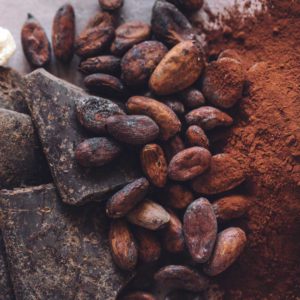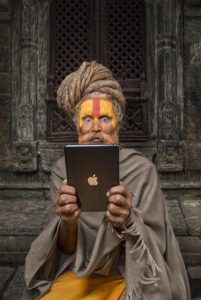It is hard to believe that this small, thin man with a shaved head and an endlessly kind, but, unfortunately, almost toothless smile, wrapped in a dhoti, home-made clothes that barely covered his nakedness, defied the violence and injustice of the 20th century.

The life of Mohandas Karamchand Gandhi was quite controversial, full of great pain, patience and love for all living things. This man may be respected or disliked, admired or ignored, but the principles of non-violence and compassion, the eternal principles of humanity that Gandhi espoused, are among those we share. Therefore, on the International Day of Nonviolence – Gandhi’s birthday – we have collected the facts of his life from those that may be of interest to our readers.
Gandhi, whom we are used to seeing in photographs in simple, hand-made clothes and sandals, was born into the family of a minister in a small principality in Western India (now the state of Gujarat).
It was said that Mohandas had never lied since childhood
One day the inspector came to the school and gave the students a dictation test. Gandhi did not know how to write it correctly, and for the sake of the school’s prestige, the teacher pushed Gandhi to spy on a classmate’s dictation. But Gandhi refused to write, which made the teacher very angry. Explaining his own behavior, the future Father of the Indian nation apologized to the teacher, explaining that he did not want to anger him and that: “I cannot write lies and I cannot say anything untrue.”
- During the first years of life in Britain, teachers noted Gandhi’s success in the humanities, terrible handwriting and weak knowledge of geography. Young Gandhi suffered from shyness and fear of public speaking. It so happened that membership of the executive committee of the London Vegetarian Society helped him to overcome some of the complexes. It is believed that Gandhi’s first essays were on the topic of healthy eating and were published in vegetarian magazines.
- Gandhi took an early vow to avoid dairy products, but after his health deteriorated, he relented and started drinking goat’s milk. Sometimes the Mahatma traveled with his goat to make sure that the milk was fresh and that he was not slipped cow’s or buffalo’s milk.
- Gandhi argued that each person should find their own diet, the one that works best. Mahatma spent decades experimenting with food, recording the results, building his own diet. He wrote a book called “The Moral Basis of Vegetarianism”.
Karamchand Gandhi was a great writer, his collection of writings is approximately 50,000 pages or more than 100 volumes.
Despite the numerous manifestations of racial discrimination against Mohandas from the moment of his birth, Karamchand Gandhi’s journey from Durban to Pretoria was irreversible in his life, during which he, an educated young lawyer, was unceremoniously thrown out of a first-class carriage because one there were not enough seats for white passengers on the train. He was subsequently beaten by a driver for refusing to ride on the foot of a transport to make room for Europeans, and finally, Gandhi was banned from staying in hotels reserved “for Europeans only”. What was new was not Gandhi’s experience, but his reaction. It was the moment of truth. And since then, Mohandas no longer perceived injustice and discrimination as part of the natural, or, rather, unnatural order of being, and began to defend his own dignity as an Indian and as a human being.
After long nights searching for his own weapon to fight injustice, Gandhi chooses “satyagraha”
This word, which, by the way, was coined by his son, can be translated as “perseverance in the truth.” The principle of non-violence, which became the basis of satyagraha as a new method of political struggle, has deep roots in the Indian spiritual tradition. Satyagraha has the most in common with the principle of ahimsa – a special attitude towards the world as a single living organism, all “cells” of which are very closely interconnected, and therefore violent influence on one part negatively affects the whole world, and above all on man, which became a source of violence. Ahimsa is both reverence for life, for an infinite number of its manifestations, but it is also a law that determines the relationships of organisms in the universe.
Mahatma Gandhi promoted football in his non-violent campaign against racial discrimination. Gandhiji helped start 3 football clubs in Durban, Pretoria and Johannesburg, all of which were named Resisters Soccer. Even the name of the football clubs was a reflection of Gandhi’s teachings (a team of supporters of passive resistance and malicious tax evaders)
Mahatma Gandhi was the founder or participated in civil rights movements on 4 continents and in 12 countries of the world
In 1919, Gandhi organized a large-scale rally for the first time, during which Indians staged a general strike and defiance of the British invaders. On the appointed day, instead of going to work, millions of people went to a peaceful protest. People marched through the streets chanting slogans about freedom and independence, but soon the situation got out of control. The crowd began to clash with the police, which led to the first casualties. Gandhi was arrested as the main organizer and imprisoned for 6 years. Opponents of the political figure believed that they succeeded in breaking the Mahatma, but in fact, this was the beginning of the self-awareness of the Indian nation and the first shock of a political earthquake that overturned not only India and Britain, but also a good part of the world.
One of the most famous actions of Gandhi and his followers was the so-called Salt March in 1930.
The Mahatma with 79 companions walked from the city of Ahmadabad to the coast of the Arabian Sea. After the end of the 390-kilometer march, during which new followers joined the group of protesters, its participants began to demonstratively evaporate salt from sea water. At the same time, as a sign of violation of the colonial salt monopoly, the participants of the “Salt Campaign” did not pay tax on salt.
The angry colony authorities threw Gandhi behind bars, but the action continued even after his arrest. About 70,000 people ended up in prison, but even that did not stop people from protesting. The police dealt blow after blow, dooming to death the unarmed Indians, who poured into the ranks of the protesters one by one, and who did not even try to defend themselves. Beaten and maimed people were dragged away to provide medical assistance. And they were replaced by others. And so to infinity. The journalists present there looked away. People went to their deaths, ready to pay such a price for their independence. The courage of the Indians and the impotence of the English had never been so evident. In the end, Gandhi was released. This protest made an impression not only on everyone present on both sides of the barricades, but also had a huge propaganda effect. It was through such actions of defiance and the discovery of incredible strength of spirit that Mahatma Gandhi and his principles gained popularity all over the world.
“With this I am shaking the foundations of the British Empire,” said Gandhi, holding a cup of common salt.
One of Gandhi’s main theses was simple: not only the British guns, but also the imperfection of the Indians themselves kept their own country captive. Their disunity, caste struggle, superstitions and lack of opportunity to get at least a basic education – all this plays into the hands of the British. Along with other appeals of the politician and his teaching of satyagraha, such things were not liked by either his enemies or many supporters.
In British India, the British used the principle of “divide and rule” for a long time, targeting the Hindu majority and the Muslim minority against each other. Therefore, even when the goal of Gandhi’s struggle was achieved – in 1947 India gained independence – it became the main disappointment of his life. Because instead of one state, two appeared on the map: the Republic of India and Muslim Pakistan. The new borders turned into bloody streams, the division of the territory caused conflicts and almost immediately turned into a full-scale war of yesterday’s allies for the country’s independence.
Gandhi, one of the few people who remained an authority for the opposing parties, went to the extreme west – in December 1948, he announced his last sixteen indefinite hunger strike. “Death will be a great release for me. It is better to die than to be a helpless witness of India’s self-destruction,” said the Mahatma. In less than two years, more than 700,000 Indians died in the country. For the Mahatma, it was a personal tragedy and pain, and he turns his hunger strike against his brother’s bloodshed. The country is freezing. In Delhi, rallies are held in support of Gandhi, and when the Mahatma is on the verge of death, the fratricidal war is stopped! Gandhi’s life was for most Indians immeasurably higher than their own ambitions. Gandhi was not bluffing, he could not have foreseen such an outcome. He just believed.
After the flames of war died down, the Mahatma threw himself body, heart and soul into healing the scars of partition. With his presence and instructions, Gandhi helped quell riots in Delhi, Calcutta, and Bengal. He comforted victims, rehabilitated refugees and convinced fanatics. In an atmosphere of hatred, pain and suspicion, this was a very difficult task for an elderly person, but the Mahatma could not do otherwise.
On January 30, 1948, on his way to an evening prayer meeting in Delhi, Mohandas Karamchand Gandhi was killed by a young Hindu fanatic. Gandhi’s assassin, Nathuram Godse, was raised as a girl during his early years due to the superstition of his own family, who believed that all men of their kind were cursed. It is not known whether there were any prerequisites for the family belief, but this family will atone for the sin of murder forever.
Gandhi fought for much more than independence. His demands included:
• civil rights for women
• abolition of the caste system
• fair treatment of all people regardless of religion
• respectful treatment of the untouchable caste, the lowest caste in India. Gandhi went through several hunger strikes in support of the untouchables, whom he called “Harian”, meaning “children of God”.
- One day after a public address, when Gandhiji was boarding a train, his sandal fell on the track. The Mahatma immediately took off the second sandal and threw it next to the first. The intention of his act is clear: a person who would find a complete pair of shoes would be able to use them.
- The first to call Gandhi Mahatma (“Great Soul”) was Rabindranath Tagore.
- Gandhi is often referred to in India as Bapu, or Baba, a gentle term that means “father.”
- Gandhi opposed the exaltation of his people and did not want to create a cult. Because: “There is nothing new that I can teach the world. Truth and nonviolence are as old as the hills.”
- Mahatma Gandhi walked/drove nearly 18 kilometers per day throughout his life, equivalent to circumnavigating the Earth twice.
- In India, 53 major roads (not counting minor ones) and another 48 roads outside the country are named after Gandhi.
- Steve Jobs was a fan of Mahatma Gandhi – his round glasses are not only similar to those worn by the Baba, but also a tribute to the great man. Gandhi’s fame spread throughout the world during his lifetime and only increased after his death. The name of Mahatma Gandhi is now one of the most widely recognized and frequently used on Earth.
- The British scholar Gilbert Murray prophetically wrote about Gandhi back in 1918: “One must be very careful in dealing with a man who is completely unconcerned with sensual pleasures, cares neither for wealth, nor for comfort, nor for praise, nor for encouragement or promotion, but just bent on doing what he thinks is right. He’s a dangerous and awkward enemy because his body, which you can always conquer, gives you so little compared to the fact that you can never possess his soul.”
- Mahatma Gandhi was a candidate for the Nobel Peace Prize five times, but never managed to receive it. The Nobel Committee publicly admitted its mistake, and in 1948, the year Gandhi died, decided not to award the prize at all, stating: “There are no worthy candidates among the living…”









